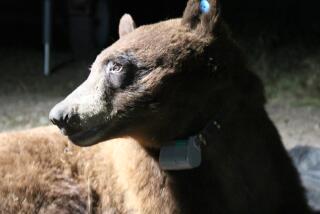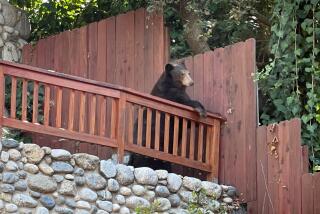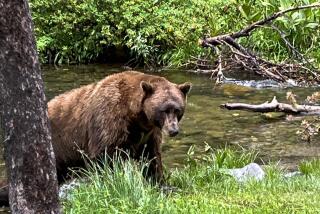Grin and Bear It? No Way, Germans Say
- Share via
VIENNA — He is wanted in Germany on charges of breaking into a chicken coop, killing sheep and -- surprise -- stealing honey.
On top of that, he’s an auslander.
Blurry mug shots of his dark face plaster towns in southern Bavaria such as Garmisch-Partenkirchen.
The culprit, a young brown bear who entered from Austria, probably in search of a mate, is the subject of a rare cultural tiff between the two German-speaking neighbors.
For several days, newspapers in Bavaria and Austria’s westernmost province have been at war over the bear, which some have named Bruno and others Petzi, after one in a children’s book series.
Bavarian authorities have given farmers, who are irate about the pillaging of their sheep, permission to shoot the bear on sight. Austrians were horrified, especially those in the westernmost province of Vorarlberg, from where the miscreant is believed to have crossed the border.
“Bavarians Want to Shoot Our Vorarlbaer,” blared the headline in the Neue Vorarlberger Tageszeitung, punning on the province’s name to show they had adopted the bear as their own, even though he probably spent no more than a week there. Experts believe he lopes more than 12 miles a day and started his journey in Italy’s Trentino Alps.
Emotions aside, the dispute is over whether the bear must be shot to stop him from harming humans, or could instead be relocated. Some Austrians do support shooting the bear, but most are uncomfortable with the idea.
People in the two countries appear to be making increasingly wild assertions. Some Austrians are claiming the bear is under the protection of Pope Benedict XVI, who, they say, recently has added a bear to his crest. Germans contend that the bear is “out of control.”
Bavarian Environment Minister Werner Schnappauf initially declared that the bear was welcome in the province but changed his mind after consulting experts. He said Monday that the animal might have to be killed or at least caged for good.
“The bear has turned into a problem bear,” Schnappauf told reporters. “The animal has to be taken out of circulation.”
In the mid-19th century, voracious hunting by the nobility and an effort to protect livestock wiped out bear populations in both countries.
When the last bear was killed in Austria in 1842, the event was celebrated by townspeople who felt “relieved of a plague,” said researchers for the World Wide Fund for Nature in Austria.
Until recently, bears in Europe were found almost exclusively in the Balkans, the Carpathian mountains, Russia and Finland.
But in about the last 15 years, Austria has made considerable efforts to bring back its bear population.
“There’s been a great change in the public mind and now there is more support for the return of the wild animals,” said Michael Martys, a zoologist and director of the Alpine Zoo in Innsbruck.
Austria’s reacquaintance with the animals began in 1972, when a bear from Slovenia migrated to the Eastern Alpine foothills. A shy creature, he lived quietly for 22 years, only occasionally venturing among humans to raid beehives.
With public acceptance of the bear, the Austrian branch of the WWF started a brown bear project and brought in a Croatian mate. They had three cubs. Today, 25 to 30 bears live in the eastern provinces of Styria and Lower Austria.
A bear management plan has also been put in place to provide remuneration for farmers who lose livestock to bear attacks. It also has “bear lawyers,” people authorized to mediate disputes between residents and wildlife activists.
If an animal attacks livestock near farmhouses or villages, the mediators help decide whether it can be shot with rubber bullets or tranquilized and relocated.
The marauding bear in Germany is believed to be a 2-year-old male from the small Trentino population who was probably pushed out by his mother and is now searching for his own territory and a mate.
Sybille Klenzendorf, the acting director of the WWF’s Species Conservation Program in the United States who did graduate work on the Austrian bear program, said the incident should be a wake-up call for Germany.
“This is not going to be the last bear to cross into Germany, so if this individual [bear] can be an ambassador, that would be a good thing,” she said. “Germany hasn’t had any bears in 170 years, so this could be a signal, so maybe they will say, ‘We need to write a management plan, we need a system of compensation in place.’ ”
For now, a cultural meltdown appears to have been averted. For whatever reason, the bear has crossed back into Austria and was sighted early Thursday by a Tirolean farmer.
And a maverick British insurance magnate has offered up to $2 million to protect the bear and to compensate those who suffer damage at the bear’s paws.
Elisabeth Penz of The Times’ Vienna Bureau contributed to this report.
More to Read
Sign up for Essential California
The most important California stories and recommendations in your inbox every morning.
You may occasionally receive promotional content from the Los Angeles Times.










